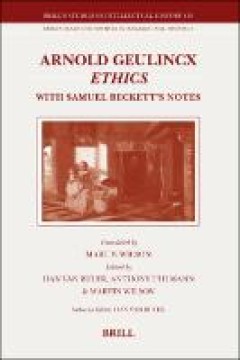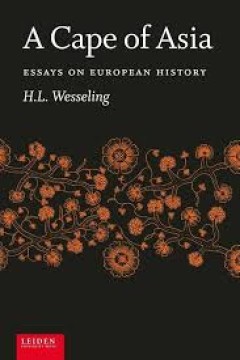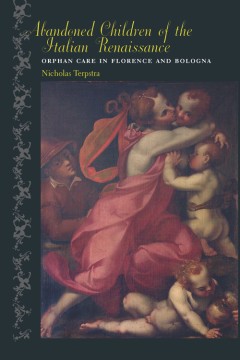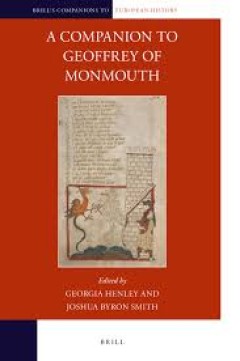Filter by

Arnold Geulincx Ethics
Arnold Geulincx (1624-1669) is a key figure in the history of ideas, whose concepts have been seen as precursors to those developed by Spinoza, Malebranche, Leibniz and Kant. His Ethics presents a treatment of virtue from the standpoint of occasionalist metaphysics. The great Irish writer Samuel Beckett stated that Geulincx, with his emphasis on the powerlessness and ignorance of the human cond…
- Edition
- -
- ISBN/ISSN
- 9789047411383
- Collation
- oer.unej.ac.id
- Series Title
- -
- Call Number
- -

A Cape of Asia : Essays on European History
A Cape of Asia collects eighteen of Wesseling's finest essays on European History, clustered around three concerns: The Wider View, or the historical European perspective on globalization, migration and decolonization; Europe's Identity, reflecting the shift from Eurocentrism to Americanization and Europe's acceptance of Japan, China and India as new key players in the global economy; and Europ…
- Edition
- -
- ISBN/ISSN
- 9789087281281
- Collation
- 176 hlm
- Series Title
- -
- Call Number
- -

A Dutch Republican Baroque: Theatricality, Dramatization, Moment, and Event
In the Dutch Republic in the Baroque era, two aesthetic formal modes, theater and drama, were dynamically related to two political concepts, event and moment. The Dutch version of the Baroque is characterized by a fascination with this world regarded as one possibility out of a plurality of potential worlds. It is this fascination that explains the coincidence in the Dutch Republic, strange at …
- Edition
- -
- ISBN/ISSN
- -
- Collation
- 228 hlm
- Series Title
- -
- Call Number
- -

A Critical History of Health Films in Central and Eastern Europe and Beyond
The burgeoning scholarship on Western health films stands in stark contrast to the vacuum in the historical conceptualization of Eastern European films. This book develops a nonlinear historical model that revises their unique role in the inception of national cinematography and establishing supranational health security. Readers witness the revelation of an unknown history concerning how th…
- Edition
- -
- ISBN/ISSN
- 9781032223544
- Collation
- 284 hlm
- Series Title
- -
- Call Number
- -

A Baronial Family in Medieval England: The Clares, 1217-1314
Originally published in 1965. In A Baronial Family in Medieval England: The Clares, 1217–1314, Michael Altschul studies the Clare family during the thirteenth century. The Clares spearheaded the struggle to enforce Magna Carta in the Barons' War. Historians prior to Altschul tended to neglect the Clares' history given the scattered nature of the archives documenting their time as a politicall…
- Edition
- -
- ISBN/ISSN
- 9781421436197
- Collation
- -
- Series Title
- -
- Call Number
- -

About Russia, Its Revolutions, Its Development and Its Present
The author analyzes modern Russian history from a new perspective. Due to the ideological heritage of the XIXth and XXth centuries, the social settings of the sociopolitical history of the USSR (1917–1945) have not been fully identified. Detailed examination of ideological and political concepts shows that the revolution of 1917 became not a middle class, proletarian movement, but rather a pl…
- Edition
- -
- ISBN/ISSN
- 9783653064735
- Collation
- oer.unej.ac.id
- Series Title
- Prager Schriften zur Zeitgeschichte und zum Zeitgeschehen,
- Call Number
- -

Abandoned Children of the Italian Renaissance Orphan Care in Florence and Bo…
In the early development of the modern Italian state, individual orphanages were a reflection of the intertwining of politics and charity.Nearly half of the children who lived in the cities of the late Italian Renaissance were under fifteen years of age. Grinding poverty, unstable families, and the death of a parent could make caring for these young children a burden. Many were abandoned, other…
- Edition
- -
- ISBN/ISSN
- 9781421429342
- Collation
- oer.unej.ac.id
- Series Title
- -
- Call Number
- -

A Companion to Geoffrey of Monmouth
A Companion to Geoffrey of Monmouth brings together scholars from a range of disciplines to provide an updated scholarly introduction to all aspects of his work. Arguably the most influential secular writer of medieval Britain, Geoffrey (d. 1154) popularized Arthurian literature and left an indelible mark on European romance, history, and genealogy. Despite this outsized influence, Geoffrey’s…
- Edition
- Volume: 22
- ISBN/ISSN
- 9789004410398
- Collation
- -
- Series Title
- -
- Call Number
- -
A Byzantine Book on Dream Interpretation : The Oneirocriticon of Achmet and I…
This monograph compares the most important Byzantine work on dream interpretation with the 2nd-century A.D. Greek work of Artemidoros and five medieval Arabic dreambooks and demonstrates that it was based on Islamic Arabic sources adapted for Christian readers of Greek
- Edition
- -
- ISBN/ISSN
- 978-90-04-47346-1
- Collation
- 524 hlm
- Series Title
- -
- Call Number
- -

A Colonial Affair : Commerce, Conversion, and Scandal in French India
Danna Agmon's gripping microhistory is a vivid guide to the "Nayiniyappa Affair" in the French colony of Pondicherry, India. The surprising and shifting fates of Nayiniyappa and his family form the basis of this story of global mobilization, which is replete with merchants, missionaries, local brokers, government administrators, and even the French royal family.Agmon's compelling account draws …
- Edition
- -
- ISBN/ISSN
- 9781501713064
- Collation
- 240
- Series Title
- -
- Call Number
- -
 Computer Science, Information & General Works
Computer Science, Information & General Works  Philosophy & Psychology
Philosophy & Psychology  Religion
Religion  Social Sciences
Social Sciences  Language
Language  Pure Science
Pure Science  Applied Sciences
Applied Sciences  Art & Recreation
Art & Recreation  Literature
Literature  History & Geography
History & Geography